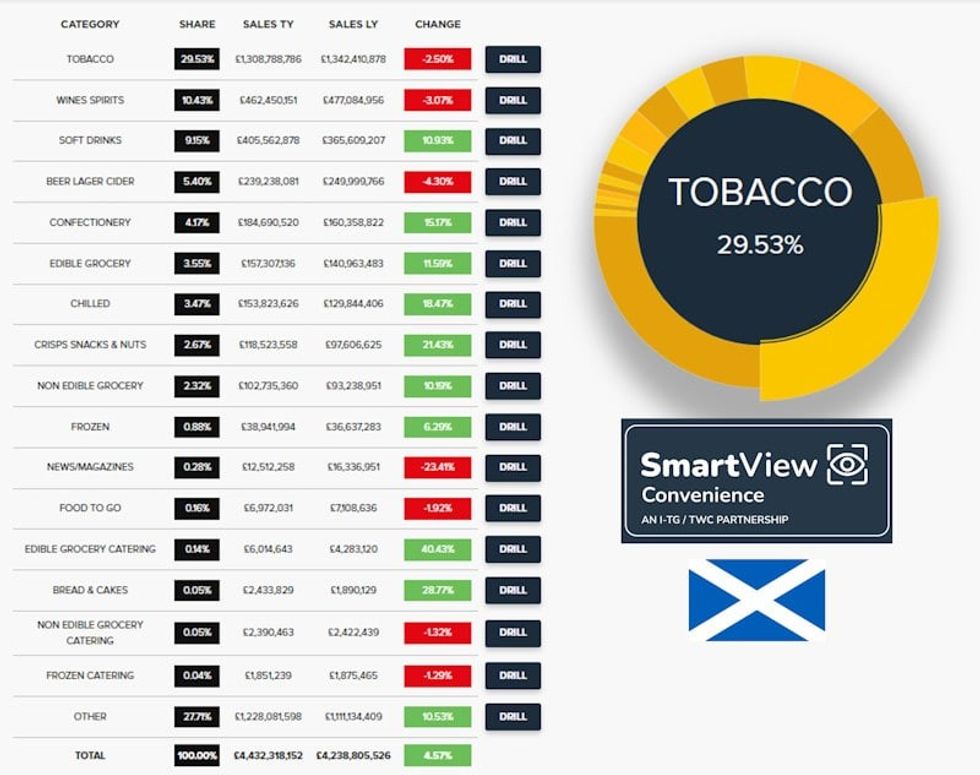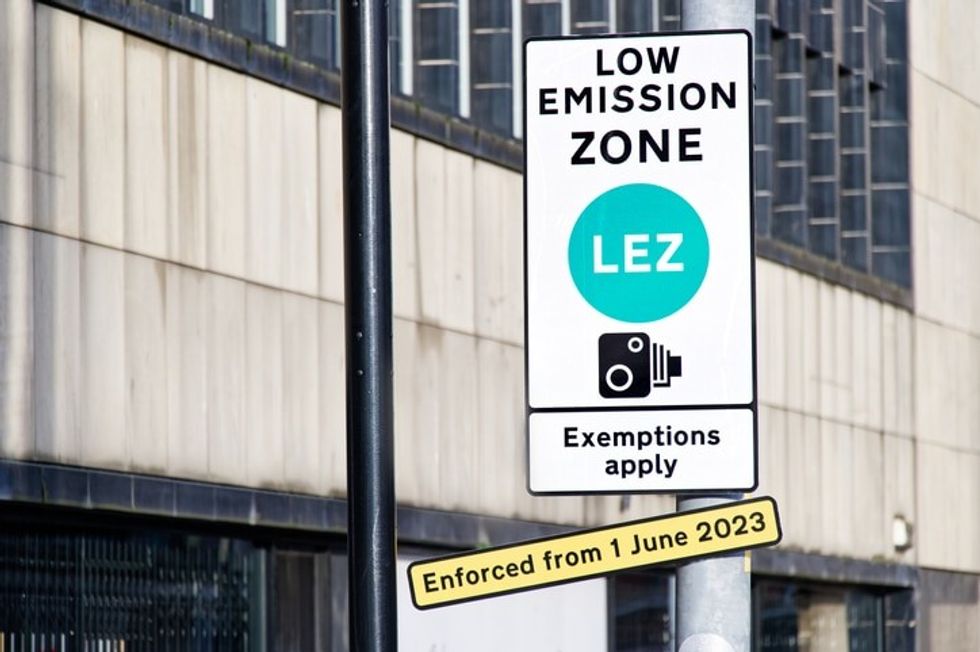Scottish c-stores are standing fast despite the headwinds of DRS, Ulez threats and the anti-vape coalition
1. STORE FRONT
The latest data from market experts TWC’s SmartView Convenience analysis demonstrates how Scottish c-stores are actually doing very well, despite the many doom-laden cost-of-living crisis headlines.
TWC samples roughly 5,000 independent symbol stores across the British Isles – and its monthly results to end July found that value sales in Scotland were up 4.6 per cent, which was ahead of and above average growth for the country as a whole. The strongest performing categories in Scotland over the period were crisps, snacks & nuts (+21.4 per cent), chilled (+18.5 per cent), confectionery (+15.2 per cent) and soft drinks (+10.9 per cent).
The previous month (to 9 July), TWC had also found a surprising resilience in sales and very strong performance particularly in impulse categories (the summer was of course in full swing) with increases in soft drinks (+15.7 per cent), confectionery (+19.8 per cent) and crisps, snacks & nuts (+21.0 per cent) – again, totalling roughly five per cent up the previous quarter.
“Despite very tough trading conditions, value sales through the independent convenience channel increased by five per cent in the last 13 weeks, driven by strong growth across impulse categories, with a particularly stellar performance in the last four weeks due to the warm weather," said Tom Fender, Development Director at TWC.
He noted that Tobacco sales declined three per cent, as has happened annually for several years now, but that the category remains a huge footfall driver and sales of vapes (about which more below) continue to expand rapidly. “We’ve also seen modest growth coming through beers & lagers despite continued promotional activity in the supermarkets,” Fender said.

So, the very latest data from TWC further confirms that the Scottish convenience channel is enjoying good health overall, (August’s figures should be out just about now, too late for going to Press).
In a separate consumer study, commissioned by TWC, 800 Scottish consumers were asked about the role of local independent convenience stores in their community. The most common response was approval for c-stores "being open and available when consumers need them", as well as the abundant employment opportunities offered by neighbourhood level retail.
Everything that Asian Trader attempts to recognise in its annual awards was cited by Scots shoppers as the defining qualities of local indie retail: fostering and contributing to the community, supporting customers with offers and fair prices – and generally being the lynchpin of both the social and economic well-being of an area.
Tom Fender concluded that, “Consumers recognize the importance of their local store and continue to support these businesses, which they see as an important part of their local community,” and added that “there is plenty of room for optimism given that inflation is now beginning to fall, and consumer confidence is rising.”
At the same time, though, it would be wrong not to recognise the headwinds that retailers face – in Scotland especially so, in certain matters.
(U)LEZ, DRS, MUP WOES ...
Two major threats from a c-store retailer’s point of view have been the abandonment of DRS and – for those in built-up areas – the looming threat of low- and ultra-low emission zones (Ulez).
To be sure, the advent of DRS had promised to bring as many problems as it did solutions, and although recycling is in itself a good thing, and there was a plan for retailer compensation for handling the bottles and cans, many believed it was insufficient and could harm and even drive some retailers to the wall under the harsh current economic conditions.
Also, the upfront costs of installing recycling machines had been sincerely believed in by many storeowners, who invested thousands of pounds to be ready for the revolutionary DRS – and who are now left with debts and redundant machines.
It remains to be seen how this will all pan out, but many retailers think they have dodged an economic bullet – at least for now. DRS is a great idea, and it works excellently in countries such as Germany and Denmark – but to make it work the bureaucracy has to be efficient, the legislation fair and equitable, and the public and recycling hosts enthusiastically on-board.
The Scottish Licensed Trade Association (SLTA) welcomed the news of the (temporary?) demise of the DRS, which is now delayed until at least October 2025, giving businesses the “breathing space they need to concentrate on the more pressing issues” said Colin Wilkinson, SLTA managing director, but warned that the next steps “must be the right steps, leaving politics out of it”.
He added: “We have always said that we will support a DRS that is workable and practicable for both businesses and consumers – the DRS proposed by the Scottish Government was not.
“Common sense has prevailed at last – yet the latest twist in this soap opera also throws up a whole load of questions: Will the UK be ready to implement a scheme in autumn 2025? Where does it leave Circularity Scotland (CLS), the scheme administrator in Scotland?”

Low emission zones (LEZ) are another controversial legislative innovation in the alleged interests of the environment and health, but which also promises a huge burden on both businesses and consumers, potentially affecting the Scottish economy in a negative way. Glasgow suffered the imposition of its LEZ on June 1 and soon after, London was handed the extension of its ULEZ (ultra-low emission zone). Already half of the enforcement cameras in the British capital have already been disabled by masked vigilantes, and it will be interesting to see what happens if Holyrood attempts to expand the programme across Scotland. Councils in England are apparently reining in their plans for lucrative ULEZ for fear of general protests.
“Let’s not forget that these LEZs will be rolled out to most of Scotland’s other major cities next year,” said Paul Waterson of the SLTS.
He called for a “much-improved, fully integrated and affordable public transport system in Glasgow” to make the scheme work: “Taxi drivers need increased assistance with finance to help them invest in new, compliant vehicles or to help them upgrade their current cabs.
“Industry, local councils and the Scottish Government all need to work hand in hand to make this work. We want it to succeed and make our city centres cleaner, less-polluted environments – but it needs to be done in the right way so everyone benefits.” An optimistic viewpoint to be sure.
And so to alcohol. Scotland was a trailblazer in the implementation of minimum unit price (MUP) for alcohol, which sought to deter consumption of cheap, over-strength beverages by setting a unit price below which retailers could not discount alcohol skus. The legislation has made alcohol – a product whose demand is famously inelastic – more expensive, which is particularly painful for those in Scotland on lower incomes but who still enjoy a drink.
Combatting claims of nanny statism, the Scottish government described fabulous health benefits due to the measure, although all was not what it seemed. It recently had to alter a press release to remove claims that minimum alcohol pricing had directly saved lives.
“The official evaluation of minimum pricing consists of 40 studies. Only one of them suggested that the policy has reduced alcohol-related deaths,” wrote Christopher Snowdon of the Institute of Economic Affairs.
“The other 39 studies indicate that the policy has either achieved nothing or has been counterproductive. The Scottish government cherry-picked the one study that supported their policy and sent out a press release insisting that minimum pricing had worked.”
Snowden said that the public had been given the false impression that minimum pricing was a success, but with alcohol-related deaths at a 14 year high in Scotland, that was contestable. Whether that will stop the government further increasing MAP is debatable, as politicians might see the death rate as a justification to further restrict alcohol despite any causal evidence.
VAPE BAN?
Despite the Office for Health Improvement and Disparities and the vast majority of the medical profession identifying vaping as at least 95 per cent less harmful than combustible tobacco, lobby groups and politicians know a whipping boy when they see one.
The admittedly sensitive problem of underage vape sales, compounded by difficulties around disposable e-cigarettes, which are the particular favourites of younger teens if they can get hold of them – and which are proving hazardous and as well as polluting in their careless disposal – means that the anti-vape movement has found a strong hand-hold and a lever with which to undermine the vaping sector. We are now in Scotland beginning to see calls for outright bans – starting with disposables.
Last week the Scottish Grocers Federation (SGF) took the bull by the horns and unveiled vaping blueprint for Scotland. It recognises that in replacing cigarettes, vapes are not only a massive health benefit, but an economic lifeline for retailers for whom vapes replace revenues from declining tobacco sales.
The convenience store trade body wrote to Scottish Government Public Health Minister Jenni Minto outlining a series of measures which it believes can help dramatically reduce vaping among children while also ensuring that adult smokers, who wish to quit smoking, can freely and easily access life-changing and life-saving alternatives to cigarettes.
They include:
- Supporting restrictions on the naming and packaging of vapes to make them less appealing to children
- But opposing restrictions on flavour, which is proven to be the key factor in switching from cigarettes to less harmful vapes
- Asking producers to encourage alternative vaping products over disposables
- But asking the Scottish Government to rule out an outright ban on disposable vapes so as not to fuel illicit trade
- Working with retailers to provide recycling options for disposable vapes.
- Ensuring that Challenge 25 checks are made to stop underage sales
- Calling on policymakers to ensure current legislation is fully enforced to publish retailers and wholesalers responsible for illegal sales of vapes
- The actions being taken by SGF - and the steps it is urging politicians to take - are outlined in a new document, Healthier Choices, Healthier Communities, which will in future be extended to similar work in the areas of harm reduction from alcohol, and high fat, sugar and salt foods.
The letter went to all MSPs, highlighting the steps being taken to ensure responsible retailing balances with the need to support the use of vapes as an alternative to tobacco, helping to make Scotland smoke-free and reducing pressures on the NHS.
Through its Healthier Choices, Healthier Communities drive SGF, which represents thousands of convenience stores across the country, will raise awareness of vaping as the proven best-known smoking alternative, but one which should only be used by smokers, not by non-smokers.
“Scotland has been a trailblazer on smoking harm reduction,” said SGF Chief Executive Pete Cheema.
“But to take the next step towards a smoke-free generation, we need a more nuanced debate about vaping. There is a poor and unproductive relationship between some manufacturers of vaping products, retailers, regulators and policy-makers, and it is creating unintended consequences.
“The Healthier Choices, Healthier Communities campaign is about balance. We want to help create public policy which simultaneously encourages vaping amongst adults who wish to quit smoking and discourages it amongst non-smokers, particularly given the evidence of young people vaping.
“We will strike that balance by advocating for a change in the naming and packaging of vapes, particularly the single-use variety, while also strongly resisting restrictions on the use of flavour - the critical characteristic of vaping products which stop smokers from lapsing back to cigarettes.”





